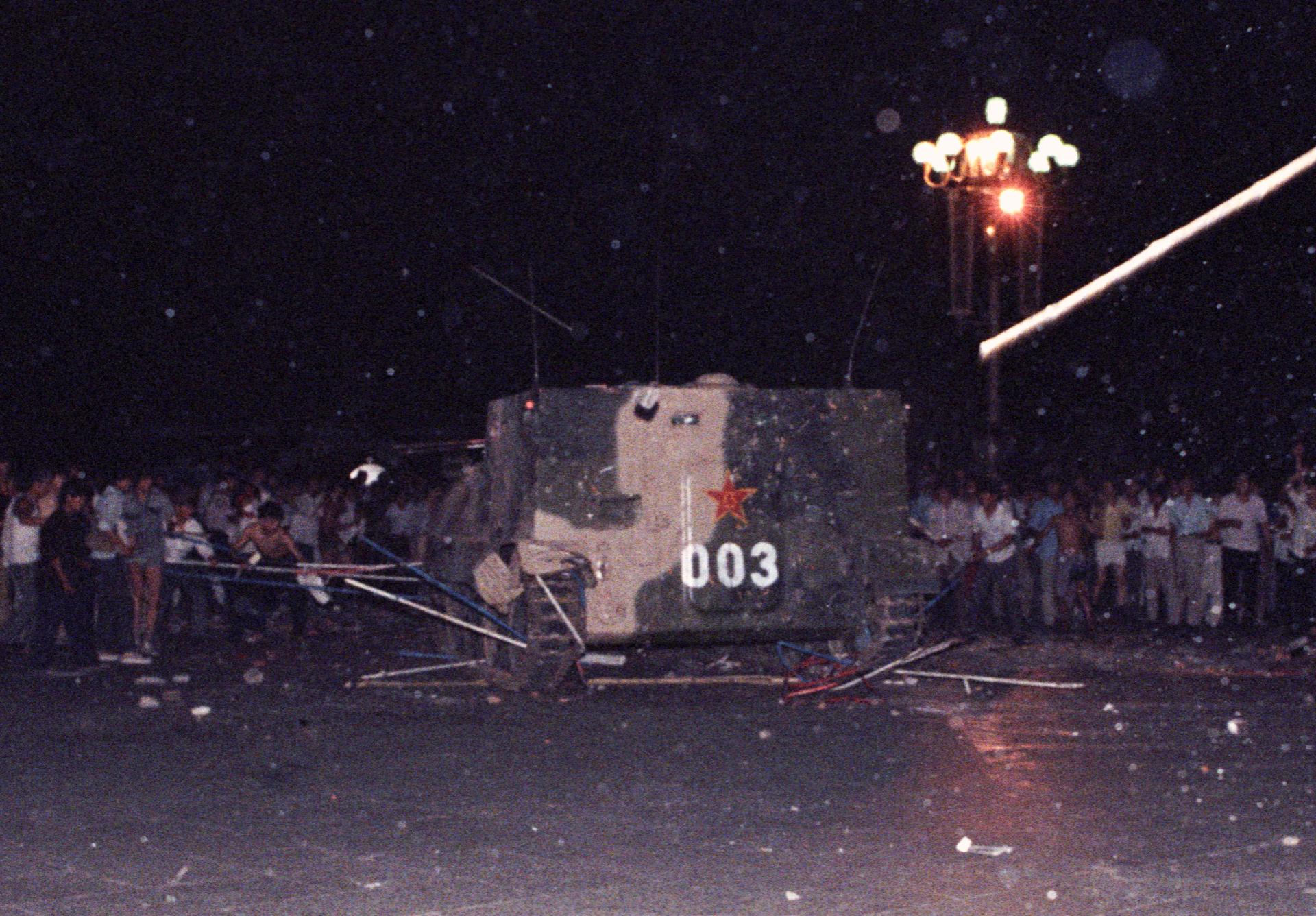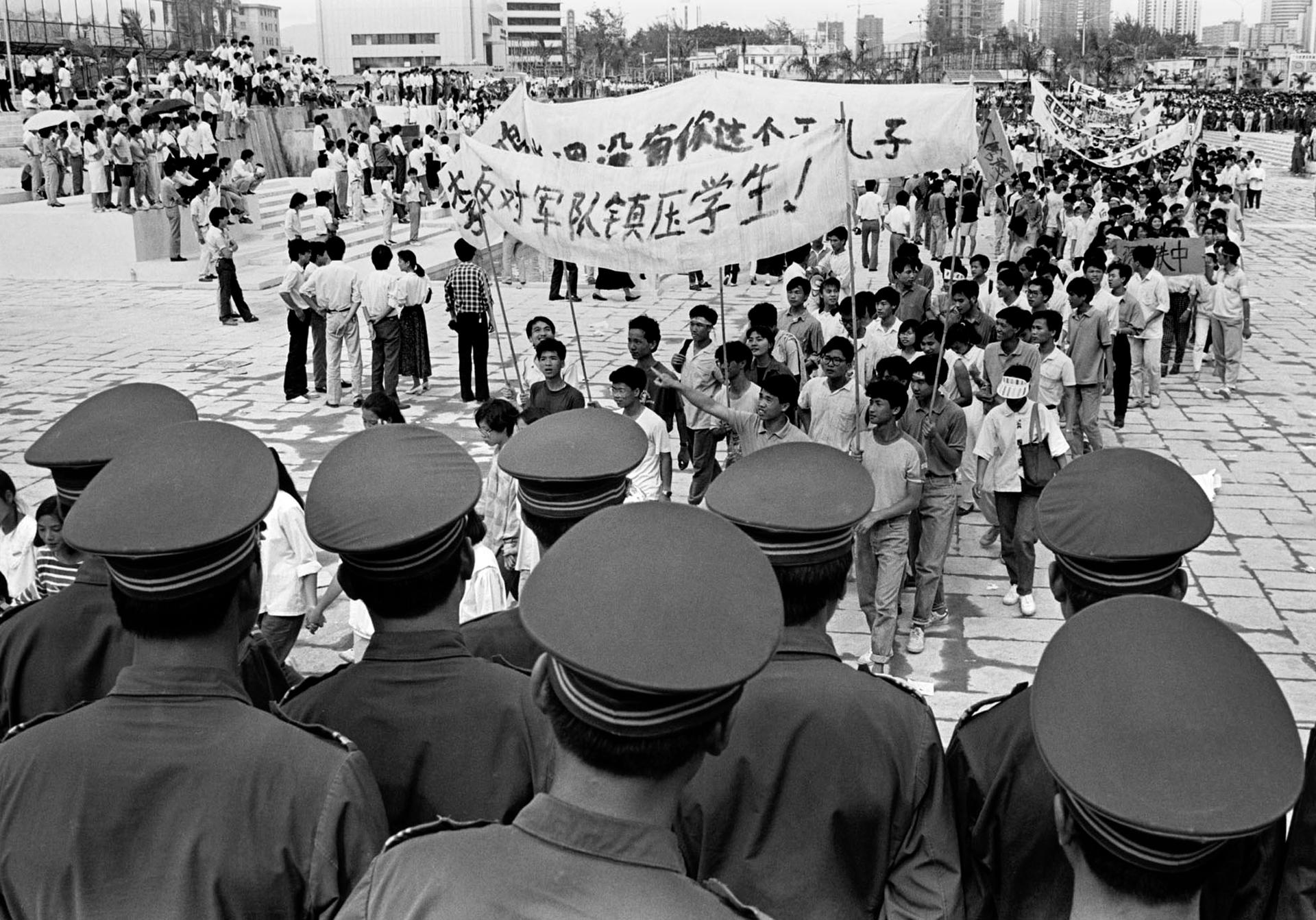25 years ago, there was dissent within the Chinese military about killing Tiananmen protesters
Chinese police monitor a march by tens of thousands of protesters in the special economic zone of Shenzhen in southern China on May 22, 1989. Hundreds of people were killed in Beijing on June 4, 1989 when Chinese troops crushed demonstrations which called for more political freedom and attacked government corruption.
More than a month after the demonstrations in Beijing's iconic Tiananmen Square began in the spring of 1989, the Chinese government decided that it had had enough. On May 19 of that year, the leadership declared martial law.
“We must end this situation immediately,” said the Chinese premier, Li Peng, in a televised address. “Otherwise, the fate and future of our People's Republic, for which numerous martyrs have shed their blood, will be in grave danger!”
Student demonstrators were defiant. They would not to back down. Instead, they organized a hunger strike and vowed to stay in the square, even as some observers began to fear the worst, that the fate of the protest movement was now sealed. And it would all end very, very badly.
 But beyond the high-level political decision about suppressing the protests by any means necessary, there were still questions about how Chinese army officers would respond if they were given orders to turn their guns against unarmed demonstrators. Rumors swirled in Beijing about the possibility of fights breaking out between rival military units.
But beyond the high-level political decision about suppressing the protests by any means necessary, there were still questions about how Chinese army officers would respond if they were given orders to turn their guns against unarmed demonstrators. Rumors swirled in Beijing about the possibility of fights breaking out between rival military units.
Those rumors proved to be unfounded. But it turns out, there was dissension in the ranks of the People's Liberation Army.
“Chinese politics and military politics is a secretive process, so it's difficult to arrive at final judgements,” says Chris Buckley of The New York Times. Buckley just co-wrote an article about dissent in the Chinese military during the Tiananmen crackdown. “My impression is that there was an undercurrent of misgivings, of uncertainty and worry within the military.”
As he got to work reporting on the official decisions that led up to the bloodshed in Beijing 25 years ago, Buckley says it was striking that he was never able to find a set of operational orders for Chinese troops in the event that they would be told to use their weapons.
“The ex-soldiers we spoke to, the former officials we spoke to, the other eyewitnesses we spoke to, all generally said that the soldiers worked in this vacuum in which they really weren't given very clear instructions about what to do, apart from this overriding imperative to clear the square by the early hours of June 4th,” Buckley says.
“Maybe there are documents we haven't seen, but it certainly seems that, for the troops on the ground, they weren't being given detailed instructions or preparations beforehand.”
For the PLA soldiers being told to clear the square, in reality that meant operating in a state of confusion.
“It's a plausible case then that this exacerbated some of the violence,” Buckley says.
Apparently, no one really wanted to give the order. And plausible deniability could be one big reason why.
“Quite understandably, the prospect of the PLA going into China's very own capital city with deadly force against China's own citizens,” Buckley says. That is especially true after the military's past experience being dragged into domestic political issues.
“During the Cultural Revolution of the 1960s and early 1970s, it had been called in by Chairman Mao to impose order,” Buckley says. “For many PLA commanders, that was a time-consuming, politically difficult and morale-sapping process. I think there was a fear that bringing troops into Beijing in 1989 would have the same consequences.”
Those rumors about the possibility of violence breaking out within the Chinese military took on a life of their own, Buckley says. And that added to the confusion.
As one member of the PLA is quoted his NYT story, Buckley says the officer's “biggest fear going into Beijing on June 3 was that he'd have to confront other soldiers.”
More than a month after the demonstrations in Beijing's iconic Tiananmen Square began in the spring of 1989, the Chinese government decided that it had had enough. On May 19 of that year, the leadership declared martial law.
“We must end this situation immediately,” said the Chinese premier, Li Peng, in a televised address. “Otherwise, the fate and future of our People's Republic, for which numerous martyrs have shed their blood, will be in grave danger!”
Student demonstrators were defiant. They would not to back down. Instead, they organized a hunger strike and vowed to stay in the square, even as some observers began to fear the worst, that the fate of the protest movement was now sealed. And it would all end very, very badly.
 But beyond the high-level political decision about suppressing the protests by any means necessary, there were still questions about how Chinese army officers would respond if they were given orders to turn their guns against unarmed demonstrators. Rumors swirled in Beijing about the possibility of fights breaking out between rival military units.
But beyond the high-level political decision about suppressing the protests by any means necessary, there were still questions about how Chinese army officers would respond if they were given orders to turn their guns against unarmed demonstrators. Rumors swirled in Beijing about the possibility of fights breaking out between rival military units.
Those rumors proved to be unfounded. But it turns out, there was dissension in the ranks of the People's Liberation Army.
“Chinese politics and military politics is a secretive process, so it's difficult to arrive at final judgements,” says Chris Buckley of The New York Times. Buckley just co-wrote an article about dissent in the Chinese military during the Tiananmen crackdown. “My impression is that there was an undercurrent of misgivings, of uncertainty and worry within the military.”
As he got to work reporting on the official decisions that led up to the bloodshed in Beijing 25 years ago, Buckley says it was striking that he was never able to find a set of operational orders for Chinese troops in the event that they would be told to use their weapons.
“The ex-soldiers we spoke to, the former officials we spoke to, the other eyewitnesses we spoke to, all generally said that the soldiers worked in this vacuum in which they really weren't given very clear instructions about what to do, apart from this overriding imperative to clear the square by the early hours of June 4th,” Buckley says.
“Maybe there are documents we haven't seen, but it certainly seems that, for the troops on the ground, they weren't being given detailed instructions or preparations beforehand.”
For the PLA soldiers being told to clear the square, in reality that meant operating in a state of confusion.
“It's a plausible case then that this exacerbated some of the violence,” Buckley says.
Apparently, no one really wanted to give the order. And plausible deniability could be one big reason why.
“Quite understandably, the prospect of the PLA going into China's very own capital city with deadly force against China's own citizens,” Buckley says. That is especially true after the military's past experience being dragged into domestic political issues.
“During the Cultural Revolution of the 1960s and early 1970s, it had been called in by Chairman Mao to impose order,” Buckley says. “For many PLA commanders, that was a time-consuming, politically difficult and morale-sapping process. I think there was a fear that bringing troops into Beijing in 1989 would have the same consequences.”
Those rumors about the possibility of violence breaking out within the Chinese military took on a life of their own, Buckley says. And that added to the confusion.
As one member of the PLA is quoted his NYT story, Buckley says the officer's “biggest fear going into Beijing on June 3 was that he'd have to confront other soldiers.”
We want to hear your feedback so we can keep improving our website, theworld.org. Please fill out this quick survey and let us know your thoughts (your answers will be anonymous). Thanks for your time!
